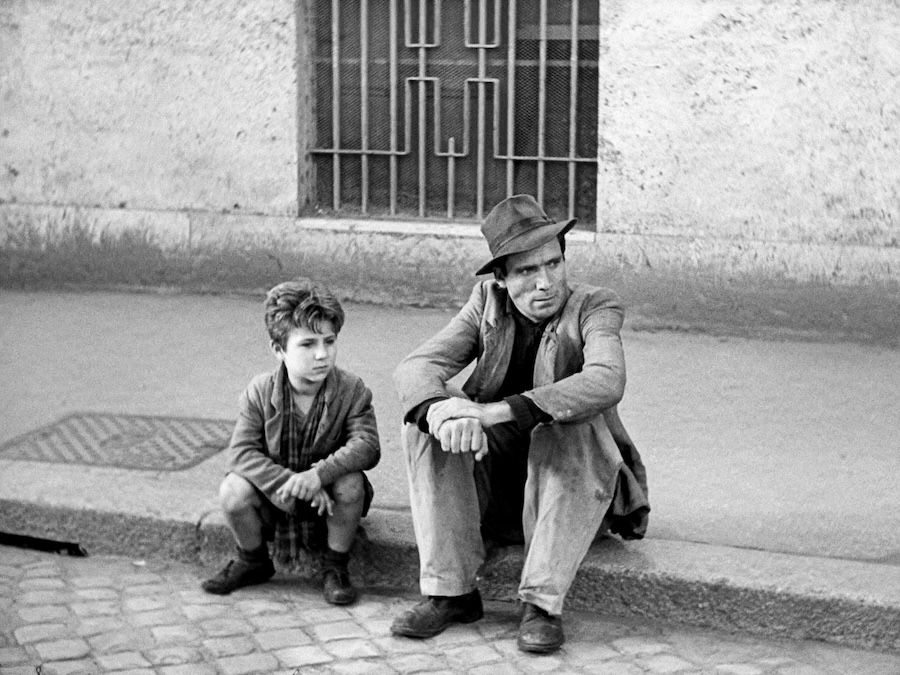

When Bicycle Thieves was released in Italy, it was far from an instant classic. Some critics considered the film too negative in its depiction of ordinary Italians. Luigi Bartolini, the author of the novel that inspired the movie, was unhappy about a huge change. In his novel, the protagonist was a middle-class intellectual, but in Vittorio De Sica’s mind, this was a story about the working class trying to survive after World War II. In the end, the change helped make this film a true classic.
In need of a bike
Antonio Ricci (Lamberto Maggiorani) is trying to find work in Rome in order to support his family, Maria (Lianella Carell) and two children, Bruno (Enzo Staiola) and a baby. He’s offered a job to paste advertising bills across town, but a bicycle is required. Antonio has pawned his bike, but a sacrifice from Maria helps him get it back and he’s hired. One day when he’s atop a ladder working, a young man (Vittorio Antonucci) steals his bike. The thief escapes and the police tell Antonio there isn’t much to do about it.
Together with Bruno and friends, Antonio starts looking for the bicycle, scouring different markets and parts of the city…
Raising funds from friends
The film shares similar themes with Shoeshine (1946), the film De Sica and Cesare Zavattini made before embarking on this project. That was a story about shoeshine boys who get into trouble with the police – why would the filmmakers care about middle-class intellectuals? De Sica fought hard for this film, raising funds from friends. The fresh neorealist tradition of authentic locations and unprofessional actors would be respected; in the filmmakers’ view, Bicycle Thieves needed a cast that lived these people’s lives.
Some of the movie’s most effective and touching moments grow out of scenes where Bruno is watching his father and following him around.
In the role of Antonio Ricci, De Sica chose Lamberto Maggiorani, a factory worker who seemed right for the part, especially since he came to the audition with his young son in tow. That kid wasn’t hired to play Antonio’s son, but I suppose De Sica saw something in the relationship that convinced him. Bruno came to be played by young Enzo Staiola, and once again it was a case of De Sica spotting something valuable in the relationship between father and son. When the director noticed him Staiola was helping his dad sell flowers on a street. Some of the movie’s most effective and touching moments grow out of scenes where Bruno is watching his father and following him around, fiercely loyal and committed to the cause of helping him find the bicycle. There’s an irresistible scene where Antonio becomes irritated and slaps the boy; it’s such a shock and source of injustice to Bruno that he initially walks away from his father… but it doesn’t last long, because Antonio can’t really do anything wrong in Bruno’s eyes. The way De Sica stages those moments and directs these people is incredibly impressive; you never really think of them as amateurs.
Bicycle Thieves has become the most famous neorealist film of them all, not least because of its power to move mass audiences; it may be sentimental to some degree, but it also enlightens us about the stark condition of the poor, how a simple bike means the difference of being able to feed your children or not. The filmmakers also emphasize how communities band together for better or worse, showing how the bicycle thief is shielded by friends and family who refuse to believe an ”outsider”.
The final scene is a conclusion that feels natural and comes across as emotionally powerful; the shame of it all is hard to watch. I’m sure Charlie Chaplin would be proud if he saw this film; De Sica was a fan and there are obvious nods to him.
Bicycle Thieves 1948-Italy. 89 min. B/W. Directed by Vittorio De Sica. Screenplay: Vittorio De Sica, Cesare Zavattini, Suso Cecchi d’Amico, Gherardo Gherardi, Oreste Biancoli, Adolfo Franci, Gerardo Guerrieri. Novel: Luigi Bartolini. Cinematography: Carlo Montuori. Music: Alessandro Cicognini. Cast: Lamberto Maggiorani (Antonio Ricci), Enzo Staiola (Bruno Ricci), Lianella Carell (Maria Ricci), Vittorio Antonucci, Gino Saltamerenda.
Trivia: Original title: Ladri di biciclette. Alternative U.S. title: The Bicycle Thief. Co-produced by De Sica. Sergio Leone, who worked as an assistant to De Sica, also appears as a seminary student. Later a stage play.
The film was awarded an honorary Oscar. BAFTA: Best Film. Golden Globe: Best Foreign Film.
